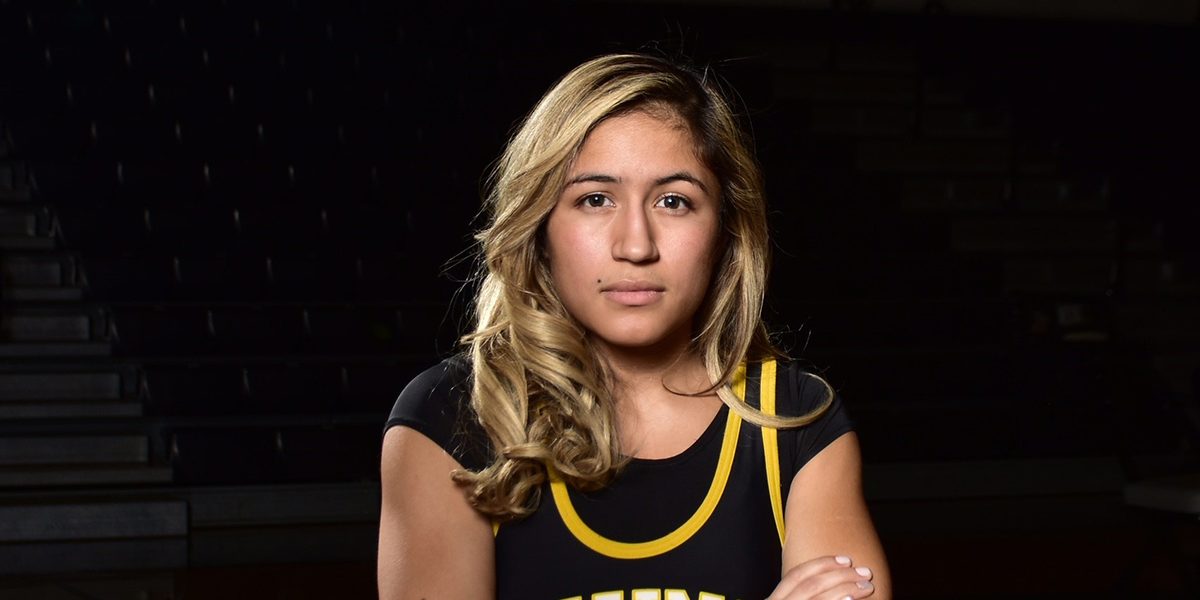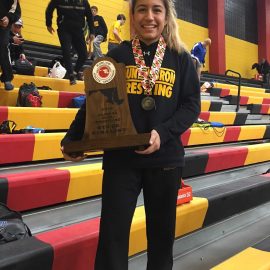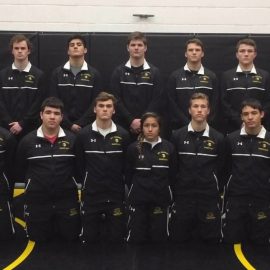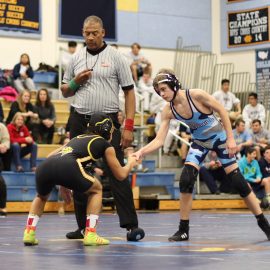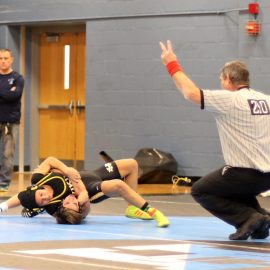Sports
Tough Enough
Cassy Lopez beat the boys in high school, so Division I women’s wrestling should be a snap.
Cassy Lopez is rattling off her many interests. She’s an 18-year-old college freshman—a “typical teenage girl,” her father says—but she already sounds like a media-savvy pro, enthusiastically reporting that she likes kayaking and going to the beach, snowboarding in the winter, and cooking, too. She’s in three clubs (environmental, Spanish, and pre-dental). Plus, she volunteers as a big sister at a local orphanage once a week and is even in a sorority.
“I’m pretty active,” Lopez notes, without irony. She’s chatting by phone just a few weeks into her first semester this fall at Presbyterian College in South Carolina.
It’s an impressively full schedule—and we haven’t even gotten to the point of this story yet. Lopez, who graduated from Mount Hebron High last spring with a 3.31 grade-point average, is the first woman to ever earn a Division I scholarship in another one her passions—wrestling, the traditionally male-dominated sport probably known more for cauliflower ear and singlets than female participation.
It’s a milestone the petite, 106-pounder with a bright smile never expected to achieve, but it’s a status she’s quickly embraced, and one that’s drawn attention from media outlets such as ESPN and now from strangers on her college campus. Asked at the end of our conversation if she has anything more to say, Lopez pauses, then delivers some sage advice worthy of a self-help book. “Take every opportunity you can, because you never know how far it will take you,” she says. “When I first started wrestling, I was pretty nervous about doing it because I was the only girl. Never did I ever think I was going to become the first female wrestler to get a Division I scholarship.”
Last December, Presbyterian, a 1,200-student private liberal arts college, announced the creation of the first Division I women’s college wrestling program, to begin competing alongside 38 other teams in the Women’s Collegiate Wrestling Association in the winter of 2019. Lopez became the team’s first member, recruited and signed by college wrestling veteran and program director Mark Cody before the school even hired a women’s head coach. Says Paco Lopez, Cassy’s father: “It’s an unbelievable story how it all played out.”
Organized women’s wrestling dates back to at least 1987, but according to USA Wrestling, the sport’s governing body, fewer than 100 girls competed at the high school level at the time. Now, the organization estimates that more than 17,000 girls wrestle, with many grappling in one-on-one battles against the 250,000-plus boys who participate.
The women’s sport is one of the fastest growing at the high school level in the United States—12 states now sanction women’s wrestling as its own sport, with six coming in 2018 alone—and Maryland’s public schools sponsored their first high school girls state tournament in February, where 80 wrestlers competed and Lopez won the 106-pound title. Stakeholders are pushing for NCAA emerging sport recognition, too.
And no, this is not the professional women’s wrestling as depicted on the Netflix show Glow, where women with names like Zoya the Destroya and Liberty Belle dress in skimpy outfits and try to titillate the audience. This is a legitimate and hardcore sport, just like the men compete in. This new generation of female wrestlers, Lopez included, are inspired by people like Rockville native Helen Maroulis, who became the first American to win a gold medal in women’s wrestling at the 2016 Summer Olympics in Rio.
Lopez got into wrestling by way of Brazilian jiu-jitsu, a martial art and combat sport that promotes the idea that a smaller, weaker person can successfully defend themselves against someone bigger or stronger. But even that was pure happenstance. Her younger brother, Lucas, had broken his arm skateboarding, leaving Paco wondering what to do with the membership he had purchased for his son at the Baltimore Martial Arts Academy in Catonsville.
“Why don’t you let your daughter try it out?” said the academy’s owner, Gary Berger. And with that, Lopez began taking classes.
Jiu-jitsu is all about ground fighting, and Lopez competed against boys, so when she sought a winter sport at Mount Hebron—she’d already decided against basketball (“Too short”) and track (“I don’t like running”). Wrestling seemed like a good fit.
“I could do it,” Lopez told her father, “but there’s no point. There’s no girls on the team.”
That’s when her dad, who’d wrestled for one year in high school at High Point High in Beltsville, posed an open-ended question that changed his daughter’s life. “Why not?” he asked her, pointing out that she’d “dominated boys” in jiu-jitsu the last two years.
Indeed, video of Lopez throwing some poor guy to a thick rubber mat in a jiu-jitsu tournament made its way to Mount Hebron wrestling coach Daniel Harman. He saw that Lopez had the ability, and toughness, to compete against the boys. He encouraged her to try out, and she made the team. There were still nuances to learn in wrestling—attacks, counters, setting up opponents in the three six-minute periods to try to gain advantage, score points, and get them to the ground—and, of course, there was overcoming that stigma about her gender. But “I started winning my first couple matches, and I really got some confidence in me,” she says. And she learned to love the spotlight. “I love the adrenaline rush when you step on the mat. It’s just you against another person. When you win and get your hand raised, it’s a rush of satisfaction that you put in all that hard work and sweat at practice.”
As she showed her mettle and skills, Lopez says she didn’t face much resistance from the boys on the team. She recalls just one incident, and it was from an opponent during a multi-team scrimmage. “One guy refused to wrestle me, and I still don’t know why,” she says. “He didn’t even confront me. It was my turn to wrestle, and his coach came over and said, ‘Sorry, he just can’t wrestle you.’ That was the only time that I experienced, not necessarily something uncomfortable, but someone who didn’t want to wrestle me because I was a female.”
Lopez spent two years on junior varsity, going undefeated as a sophomore to win a Howard County title. She dedicated herself to fitness and nutrition, eating a low-fat, high-protein diet. She won, in her estimation, 98 percent of her matches by headlock, earning her the nickname “The Headlock Queen.”
“Pretty much any time she would throw a headlock, the guy would end up on their back and she’d end up with a pin,” Harman says. “Countless times that happened in the gym, and then you’d have all eyes on her. Then you’d have the ‘oooh’ sound from the crowd.”
Lopez moved to varsity as a junior and senior and finished with a 45-29 record, pinning her male opponents 32 times and often bringing crowds to their feet. “It was amazing to watch how everyone cheers for her,” Paco Lopez says. “Other teams, other parents, the whole place went nuts when she got on the mat.”
She then dominated the first Maryland public school tournament for girls, pinning each of her first three opponents in 20 seconds or less before winning the championship. It was her fourth individual state championship, to go with a pair of Maryland State Wrestling Association Triple Crown Awards.
In the offseasons, Lopez trained with the Columbia-based Orange Crush club team and the Maryland Women’s National Team, which she captained in 2015. She received recruitment letters from schools in Arkansas, Georgia, and Virginia, but none felt like the right fit. She had decided she wanted to stay close to home and pursue a path that could position her for her dream job as an oral surgeon. That was inspired by her mom, who worked 18 years for a dentist. So, one year ago, Lopez went on Instagram and announced she was done with the sport.
“The wrestling world here was shocked,” her father says. “This is the No. 1 female wrestler in the state, and she’s not going to wrestle in college, especially after all these other colleges were recruiting her?”
She was planning to go to an in-state school and not wrestle at all when Kerry McCoy, the head men’s wrestling coach at the University of Maryland, who also ran girls’ training camps in College Park that Lopez attended, told her in April about the startup Division I program at Presbyterian. He intuitively knew she would be a good fit.
“She has all the qualities of a wrestler—hard work and dedication—and she’s also just an awesome person,” McCoy says.
Lopez emailed Presbyterian program director Cody, who happened to be nearby in Washington, D.C., for a banquet. After hearing about Lopez’s resume, he gladly agreed to meet the next day.
Over lunch at a D.C. hotel, Cody talked about the new team and the importance of academics. And the two even had a connection: Turns out, Cody’s father-in-law is an oral surgeon. “That helped out,” Cody says. “But it just shows that right across the board, she’s very goal-oriented. She’s the total package, and someone you can build a program around.” It was just a matter of time before an official scholarship offer was made.
Neither the program nor Lopez’s family would prefer to disclose the details of the scholarship. “All I can tell you is, what you imagine, it is,” Paco says. But Lopez made history by signing her national letter of intent in May.
“It’s great for the state of Maryland to have a representative who’s got some acclaim for women’s wrestling,” says McCoy, the Terps’ head coach, who broke ground of his own in 1997 when he was the first African-American to win the Hodge Award as the nation’s top collegiate wrestler. “It shows the direction we’re moving as a sport, to have people reach these milestones. Hopefully, years from now, it’s not a big deal if a female gets a scholarship to wrestle.”
Lopez is the first in her family to attend college, and she’s soaking up every minute of it. In addition to all the off-the-mat activities, she is a key figure in a history-making athletic program in its nascent stages, although the women’s team won’t start formal outside competition until next winter. Meanwhile, the coaches are putting Lopez and the three other women on the inaugural roster through rigorous cardio training—football field sprints, bleacher runs, and the like. A new wrestling room for the women’s and men’s teams was expected to be finished in mid-October. “Hopefully we’ll jump on the mats soon,” Lopez says.
And she’s already become something of a minor celebrity on campus. “Oh my God, you’re the wrestler,” someone recently told her, after recognizing her from a school publication. Lopez welcomes the role of ambassador and loves interacting with kids, girls, whomever, as long as they are interested in the sport. “It’s pretty flattering, and definitely an honor,” she says. “Like I said, any opportunity that comes up, I highly recommend jumping on it.”
